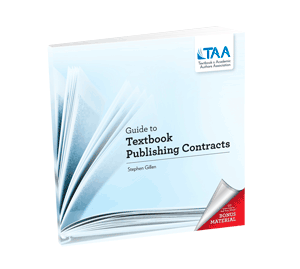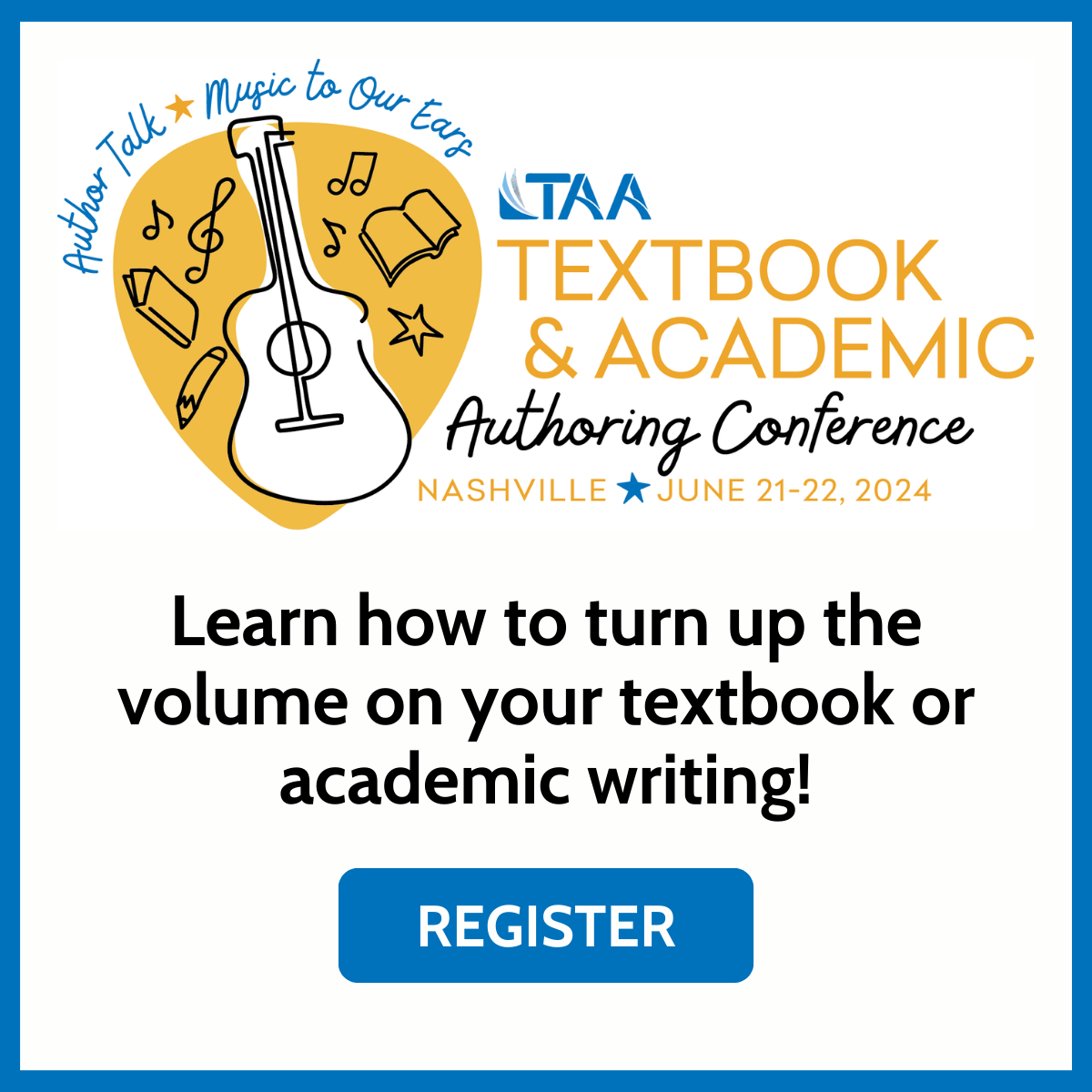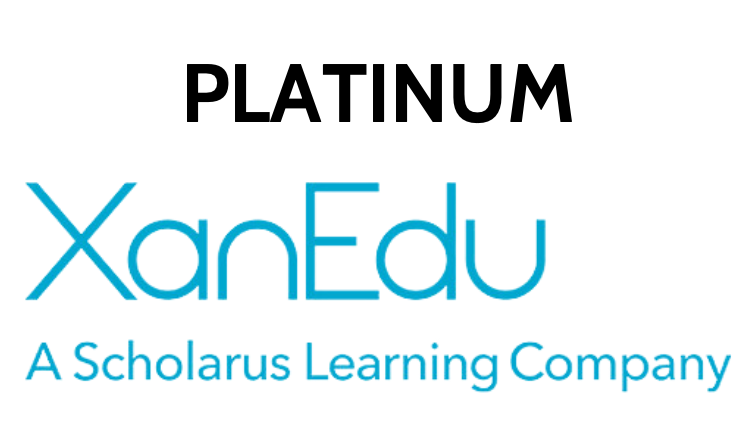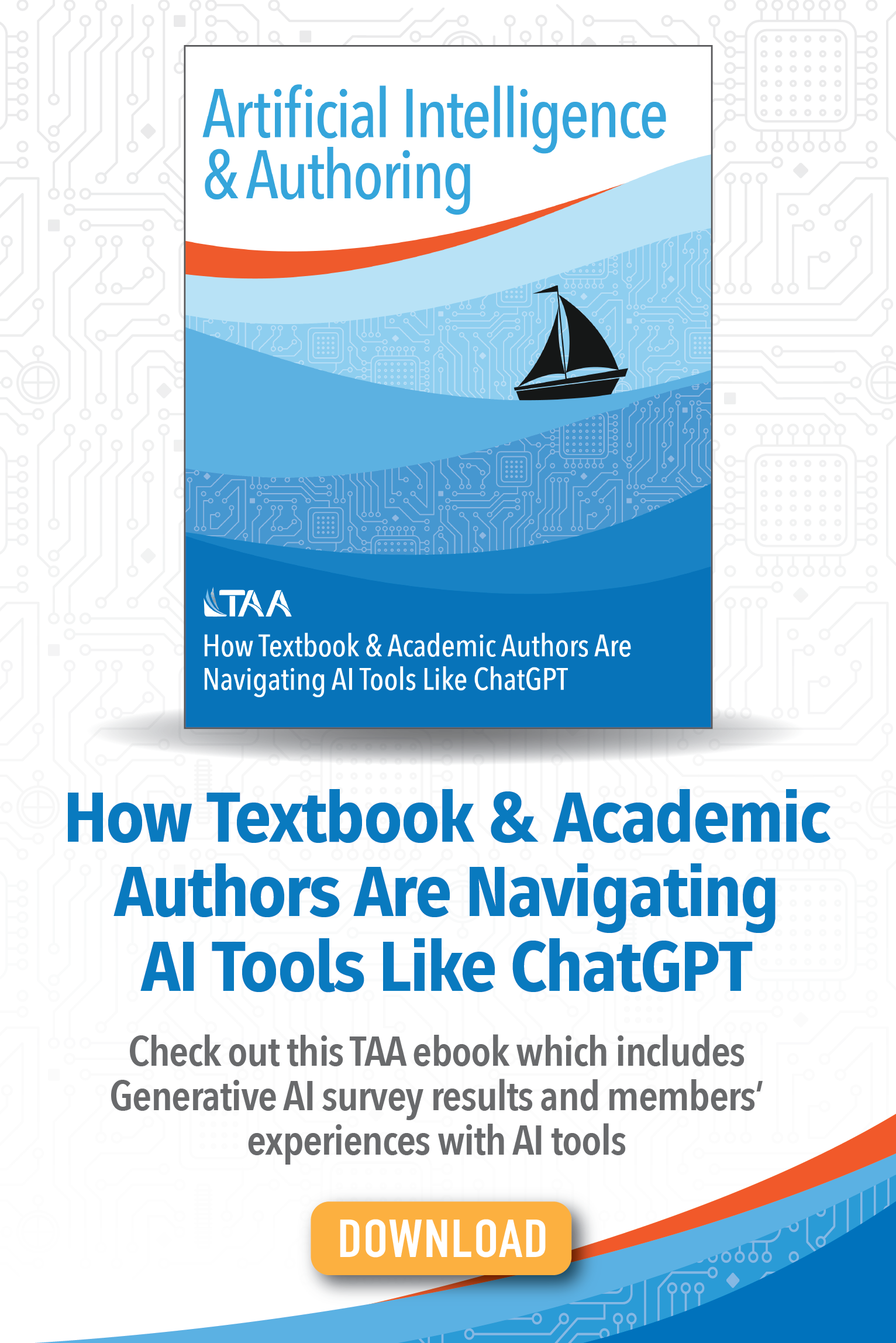Guide to Textbook Publishing Contracts | Media Kit
Below you will find various resources for Guide to Textbook Publishing Contracts. For media, interviews, and book review requests, contact:
Kim Pawlak | Director of Publishing & Operations, TAA | (507) 459-1363 | [email protected]
 Product Details Product Details
eBook - Pages: 40 | Edition: 1st
Pricing - $7.95
Paperback - Pages: 54 | Edition: 1st | ISBN: 9780997500400
Pricing - $14.95
Publisher: Textbook & Academic Authors Association Press
Download the press release
Download book cover image: For web | For print
Download author photo: For web | For print
Table of Contents
About Guide to Textbook Publishing Contracts
Long Blurb (292 words):
Textbook authors have more to review on the standard textbook publishing contract and more leverage to negotiate than they might think, says Stephen Gillen, a Partner at Wood Herron & Evans, and author of a book published by the Textbook & Academic Authors Association, Guide to Textbook Publishing Contracts (ISBN 9780997500400; $24.95 eBook, $29.95 print).
“Odds are, you will not prevail on all of the clauses you want to negotiate,” he said. “But odds are equally as good that you will not lose on all of them either. In any event, you will not get that for which you do not ask. So ask away—at the end of the day you will have a better deal.”
In this step-by-step guide, Gillen illustrates the key provisions of a typical textbook contract and how textbook authors can determine what's important to them so that they can enter into the contract negotiation process better informed. He shares the "typical", "better" and "better still" options authors can consider when making decisions about what to negotiate.
Kevin Patton, award-winning author of Anatomy & Physiology, 9e, said: "I’ve never recommended a law book to my friends (or anyone, for that matter). However, I strongly advise anyone interested in textbook authorship, whether looking forward to a first contract or having recently signed your umpteenth contract, to read Guide to Textbook Publishing Contracts. Then remember where you put it when you are finished because you’ll want to go back and use it each time you are offered a new contract or amendment."
Michael Sullivan, award-winning author with 14 mathematics textbooks currently in print, said: "Steve Gillen’s Guide to Textbook Publishing Contracts is not just reading material, it is an indispensable reference, whether you are a first-time or experienced author."
For more information, visit http://bit.ly/textbookcontractsguide
Short blurb (74 words):
In Guide to Textbook Publishing Contracts, Stephen Gillen, a Partner at Wood Herron & Evans, shares the key provisions of a typical textbook contract and how authors can determine what's important to them so that they can enter into the contract negotiation process better informed. This step-by-step guide includes the "typical", "better" and "better still" options authors can consider when making decisions about what to negotiate. For more information, visit http://bit.ly/textbookcontractsguide
Author Bio
Stephen E. Gillen is the author of Guide to Textbook Publishing Contracts. He teaches Electronic Media Law at the University of Cincinnati College Conservatory of Music. He worked for nearly 20 years in publishing prior to entering private practice in the middle 1990’s. He is presently a partner at Wood Herron & Evans (a 145-year-old Cincinnati law firm focused on intellectual property) where he concentrates his practice on publishing, media, and copyright matters. He is a long-time member of the Textbook & Academic Authors Association (TAA) Council and a regular speaker at TAA conferences.
Short version:
Stephen E. Gillen is the author of Guide to Textbook Publishing Contracts. He teaches Electronic Media Law at the University of Cincinnati College Conservatory of Music and is a partner at Wood Herron & Evans where he concentrates his practice on publishing, media, and copyright matters.
Praise for Guide to Textbook Publishing Contracts:
"Steve Gillen’s Guide to Textbook Publishing Contracts is not just reading material, it is an indispensable reference, whether you are a first-time or experienced author."
- Michael Sullivan, award-winning author with 14 mathematics textbooks currently in print
"I’ve never recommended a law book to my friends (or anyone, for that matter). However, I strongly advise anyone interested in textbook authorship, whether looking forward to a first contract or having recently signed your umpteenth contract, to read the Guide to Textbook Publishing Contracts. Then remember where you put it when you are finished because you’ll want to go back and use it each time you are offered a new contract or amendment. "
- Kevin Patton, award-winning author of Anatomy & Physiology, 9e
Read Kevin's review of Guide to Textbook Publishing Contracts on his blog, The Textbook Author.
“When I got my first book contract in 1967, I didn't ask many questions. Actually, I didn’t know what to ask. Oh what I would have given back then to have something like Steve Gillen’s Guide to Textbook Publishing Contracts. Steve’s book is a must for first time authors, and a good source of information for all authors. Authors would do well to heed the advice to carefully determine what is important to them and to learn how to interact with editors—these are important. The glossary alone provides information worth the price of the book. My advice would be to read this guide and then hire a good lawyer when negotiating a contract.”
- Chuck Corbin, author of more than 100 books including Textbook Excellence Award winner Fitness for Life (6e)
“In Guide to Textbook Publishing Contracts, Stephen Gillen provides a complete and comprehensive course of instruction that is as 'user friendly' as it is do-it-yourself practical."
-- James A Cox, Editor-in-Chief, Midwest Book Review. Read full review
Interview Resources
Suggested Interview Questions:
- Why is it important for authors to negotiate a standard publishing contract?
- Should authors try to negotiate all clauses? If not, how can they determine which clauses to negotiate?
- Which clauses in a standard publishing contract, if not negotiated, tend to cause problems for authors later?
- What is the difference between an advance and a grant? If an author negotiates an advance, what elements should they be sure this clause includes? If an author negotiates a grant, what elements should they be sure this clause includes?
- What is the norm for royalty rates for eBooks and how important is it to cover eBook royalties in today's textbook publishing contracts?
- Who would benefit from this book?
Twitter & Facebook Posts
For Twitter, you can include @TextandAcademic and/or #TextbookContractsGuide
Excited to read "Guide to Textbook Publishing Contracts" by Stephen Gillen. Check it out at http://bit.ly/textbookcontractsguide
"Guide to Textbook Publishing Contracts" - A great book from @TextandAcademic http://bit.ly/textbookcontractsguide
You have more leverage in the contract negotiation process than you think. http://bit.ly/textbookcontractsguide
Learn what textbook contract clauses to negotiate with this book from @TextandAcademic http://bit.ly/textbookcontractsguide
Get on an even footing with your textbook publisher. Learn the clauses to negotiate. #textbookcontractsguide http://bit.ly/textbookcontractsguide
You have more leverage than you think.
In this step-by-step Guide to Textbook Publishing Contracts by Stephen Gillen, a Partner at Wood Herron & Evans, you will learn the key provisions of a typical textbook contract and how to determine what's important to you so that you can enter into the contract negotiation process better informed. Get the "typical", "better" and "better still" options you can consider when making decisions about what to negotiate. http://bit.ly/textbookcontractsguide
|





